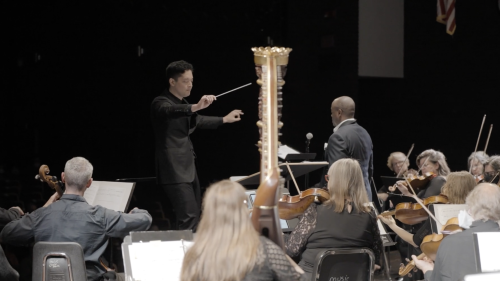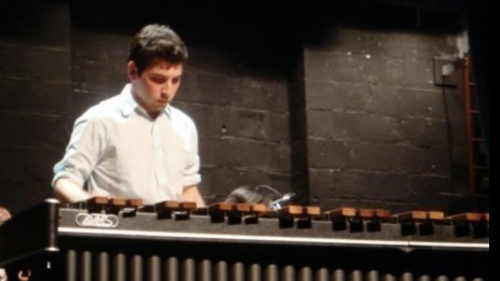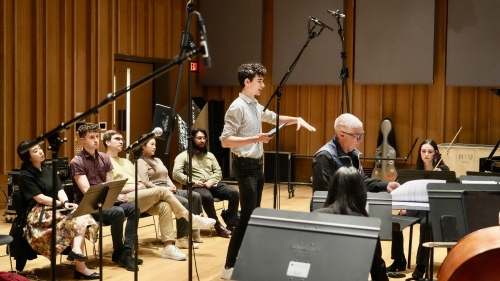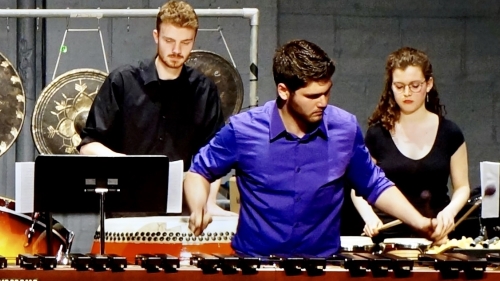
Paul Frucht
On his eighteenth birthday, Paul Frucht, who studied both Music Composition and Percussion at NYU Steinhardt and is a current adjunct professor, attended a rally for then-Senator Barack Obama in Washington Square Park. It was an inspiring event for the young college student who was just one month into his undergraduate studies at NYU.
Eleven years later, Frucht began developing A More Perfect Union, a symphony for baritone and orchestra based on six pivotal speeches of former president Barack Obama.
The piece intentionally rebuts the pessimistic, currently in-vogue narrative of American decline by musically asserting one of President Obama’s key messages throughout his tenure: that the forces that divide us are not as strong as those that unite us.
Frucht sees the power of classical music as its ability to address modern culture in a serious way. He first came to this realization with his piece Dawn, which premiered in 2013. Dawn is about Dawn Hochsprung, the principal of Sandy Hook Elementary School in Connecticut, who was murdered while trying to protect her students. Frucht himself had been one of her students in middle school and was inspired to tell her story. He was moved by the experience of writing Dawn and having it tour the United States, how it “fulfilled the promise of an art form that can go unnoticed.”
If the audience remembers an event described in a piece of music, it resonates with them. “There’s a big difference between writing an abstract piece of music and a piece of music that's really meaningful for people,” Frucht said. Work that addresses everyday life is “something I’ve been really interested in pursuing with my own artistic practice. The point of art is to make us think about the world around us,” he noted.
Frucht collaborated on A More Perfect Union with his graduate school classmate Yuga Cohler, who is now the artistic director of the Ridgefield Symphony Orchestra, the ensemble that commissioned the piece. Attracting more audiences to classical music is a goal of Frucht and Cohler’s: “Orchestra and opera are uniquely situated to address topics with gravitas and weight. They enrich us as a society.”
“In A More Perfect Union, the musical language is written to be rich and complex and the subject matter is accessible because it happened in the last 10-15 years,” said Frucht.
Cody Keenan with Frucht at the premiere of "A More Perfect Union"
To compose this symphony, Fruct and Cohler met with President Obama’s speechwriter Cody Keenan, and together they selected six speeches to incorporate: “A More Perfect Union;” Obama’s inaugural address; a speech to the American Medical Association in which Obama argues for healthcare reform; a talk on American military action in Syria; a reflection on the 50th anniversary of Bloody Sunday in Selma, Alabama; and Obama’s eulogy for Reverend Clementa Pinckney who was killed in the Charleston church shooting in 2015.
A More Perfect Union was slated to premiere in April 2020, and the momentous events that followed meant that a lot had changed by the time it premiered in October 2021. However, Frucht still sees its underlying message ringing true, that we need hope and unity to move forward and those messages can be found in President Obama’s words.
Frucht answered some questions about A More Perfect Union, his studies at NYU, and his work as the artistic director of the Charles Ives Music Festival.
Tell us about A More Perfect Union.
A More Perfect Union is a symphony for baritone and orchestra based on the speeches of President Obama. The work was commissioned by the Ridgefield Symphony Orchestra, Yuga Cohler and I co-created the project, and I wrote the music. We were fortunate to work with President Obama's Chief Speechwriter, Cody Keenan, who provided valuable insight into the creation of the selected speeches and collaborative process between President Obama and his speechwriting team. The piece premiered last month with RSO led by Yuga Cohler featuring baritone Jorell Williams. A More Perfect Union sets six of President Obama’s most critical monologues to music in an attempt to elevate the universal but distinctly American themes contained therein: unity, pluralism, spirituality, democracy, and hope. The piece intentionally rebuts the pessimistic, currently in-vogue narrative of American decline by musically asserting one of President Obama’s key messages throughout his tenure: that the forces that divide us are not as strong as those that unite us.
Whose idea was it?
It was my idea, but as a result of many conversations Yuga and I had in graduate school at Juilliard and the origin of it would really be back in September 2007 – on my 18th birthday, one month into my freshman year at NYU – then-Senator Barack Obama came to Washington Square Park to hold a rally. It was one of the most impactful evenings of my life. His oratory and the values weaved throughout were astoundingly appealing to me then and remain so. Several years later during our time at Juilliard, Yuga and I would often talk for hours, debating how classical music can appeal to more people and what the role of classical music is in modern American society. One core idea we agreed on was that the power and weight of art music allows for it to uniquely and profoundly address issues, events, and people of our time and that that is perhaps classical music's greatest asset. Several project ideas came out of those conversations including this one. When Yuga won the RSO job, I coincidentally happened to have an outstanding commission with them. When we found out Cody Keenan was also a Ridgefield High School graduate, the stars aligned and we went forward.
What was your process like composing it?

"A More Perfect Union"
The primary concern, as it is with all vocal pieces, was making sure that I was doing justice to the text. President Obama's speeches are written and constructed with such incredible elegance and I wanted to make sure that the musical ideas that recur throughout the piece would capture that elegance in a way that is immediate and accessible to the audience. The entire work closes with the moment President Obama sang "Amazing Grace" while giving the eulogy for Reverend Clementa Pinckney, who was killed at the Mother Emanuel AME Shooting in Charleston, SC in 2015. What was so incredible about that moment was how shocking it was to see the president sing on national television and yet at the same time, it felt so inevitable when it happened. That inevitably is something I think many, if not all, artists and creators chase – to make the audience feel as though the most meaningful moments in your work could not have happened any other way. Making sure that that moment in our piece, when he finally sings "Amazing Grace," feels as musically inevitable as it does dramatically (and did at the time it happened in real life) was the greatest challenge of writing this work. So I decided to deconstruct the melody to Amazing Grace and really find out what makes it tick, what makes it memorable, and what's in its "musical DNA" so-to-speak. I then took those raw musical elements in the tune and embedded them in the recurrent themes of the piece so that musically, the whole piece is just one giant melodic evolution to inevitably hearing "Amazing Grace," ideally matching the inevitably of that real-life moment.
Why now?
This is an interesting question because "now" applies to the world this piece would have premiered in (April 2020) had the COVID-19 pandemic not happened, but it also applies to the world we currently occupy in which much has changed since when this work was largely completed in February 2020: a once a century pandemic, an historic election resulting in a change in presidential administration, and among the largest civil rights protests in American history. But one thing that has not changed is that we are a society in need of hope and deeply in need of unity in order to forge a path ahead. President Obama presented a path through his belief that to be American is to believe, hope, and push for a more perfect union. Those words and those ideas are, at least to me, still appealing, meaningful, and timely. The purpose of treating this subject musically was not partisan; on the contrary, it was to shed light on a responsibly optimistic path forward for American political culture as well as its musical one. As I mentioned, one function that classical music provides is to tell the stories of our time with a level of weight that is unique to the genre. By combining the drama and beauty of President Obama’s speeches with the gravitas that the orchestra and singer provide, our hope was to prove a symbiotic relationship between modern culture and classical music.
Does President Obama know about A More Perfect Union?
Yes, President Obama is aware of the project. A member of the audience asked Cody Keenan just that question at the preview event and Cody replied that he let him know after Cody had coffee with Yuga and me in November 2018. Cody said he told him that he had just met with these guys who were going to make a symphony out of his speeches, to which President Obama replied, "Really? That's cool! How do you that?"
I had such a unique and wonderful experience at NYU. Justin Dello Joio, I really have to say, is one of the most important people I've ever met in my life. He was the first person who ever told me unequivocally that I could be a composer. Without his genuine care, inspiration, miraculous talent and unique ability to convey it pedagogically, I simply would not be a composer.
How did your education at NYU prepare you for your career as a composer?
I had such a unique and wonderful experience at NYU. I was both a composition major - studying with Justin Dello Joio for three years while studying with Youngmi Ha my freshman year - and a member of the percussion studio, where I worked with Jonathan Haas, Simon Boyar, Jim Saporito, and Josh Quillen. They each gave me such unique perspectives. Justin, I really have to say, is one of the most important people I've ever met in my life. He was the first person who ever told me unequivocally that I could be a composer. Without his genuine care, inspiration, miraculous talent and unique ability to convey it pedagogically, I simply would not be a composer. To experience at ages 18-21 that kind of support and belief in me from someone so successful and talented in his own rite is something that is so rare and something I'm so grateful for, both to him and NYU. Playing in the percussion studio was an absolute blast. I really learned how to be a professional and Jonathan and Simon were both really generous in encouraging me to write new pieces frequently for the various percussion ensembles. Jonathan also really taught me how to be savvy, something that has come in handy in my work as artistic director of the Charles Ives Music Festival. My theory and ear-training classes were also very inspiring to me, especially Theory IV which covers 20th century harmony and is a course I teach now myself.
At Juilliard, I continued with composition, receiving a master of music degree in 2013 and a doctor of musical arts degree in 2018. I primarily focused on orchestral, chamber, and vocal concert composition, studying with Robert Beaser. During my time there, I had my work performed by the Juilliard Orchestra, San Diego Symphony, Milwaukee Symphony, American Composers Orchestra, and the Ridgefield Symphony Orchestra, and represented Juilliard and the U.S. at the Kyoto International Music Festival in 2016.
What do you teach here now?

Frucht playing the Ewazen marimba concerto with the NYU Orchestra during his junior year at NYU.
I teach in the music theory program, teaching music theory and aural comprehension. I'm excited next semester to teach Theory IV fully in-person for the first time since 2019! It's one of my favorite courses to teach since we really get to explore more contemporary music and how harmony evolves in the 20th century. I also really enjoy teaching aural comprehension since the skills are so vital to a career in music performance of many kinds. Helping students master these skills is very fulfilling.
Tell us about your work with the Charles Ives Music Festival.
CIMF is based in Fairfield County, CT, where I grew up and honors the legacy of Charles Ives, also from Fairfield, through a series of chamber concerts focused on contemporary American music as well as educational events focused on providing a quality chamber music and orchestral experience for youth musicians. Our concerts feature performances by recent grads who hold positions in major orchestras and in touring chamber ensembles as as well as successful freelance and Broadway musicians. These musicians join us in Connecticut for two weeks and in addition to performing the concerts are the faculty working with our students in the educational program. I founded the music festival in 2015 and joined forces with our umbrella organization, the Western Connecticut Youth Orchestra, in 2019. This past summer, we had 70 participating musicians and performed the works of 2021 composer-in-residence Kati Agócs as well as other living composers including Matt Aucoin, Timo Andres, Robert Beaser, Derek Bermel, NYU alum Jon Cziner, Reena Esmail, George Meyer, Jessie Montgomery, Harriet Steinke, NYU faculty Shelley Washington and Julia Wolfe, and me.
Which composers have had the biggest impact on you?
This is so tough, but In addition to my two teachers, composers who are inspiring my work right now are Steven Stucky, John Corigliano, Melinda Wagner, Aaron Jay Kernis, Reena Esmail, Kevin Puts, Joseph Schwantner, Jacob Druckman, Amy Beach, Ravel, Stravinsky, Debussy, Brahms.
Watch an excerpt of “Eulogy for Reverend Clementa Pinckney”
Watch an excerpt of “Address on the 50th Anniversary of the Selma, AL March”
Watch the full video from the preview event featuring NPR’s Suraya Mohamed in conversation with Frucht, Cohler, Keenan, and baritone Jorell Williams.



